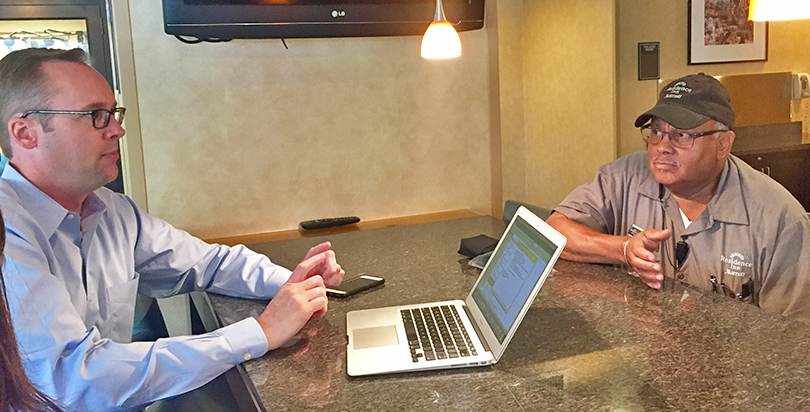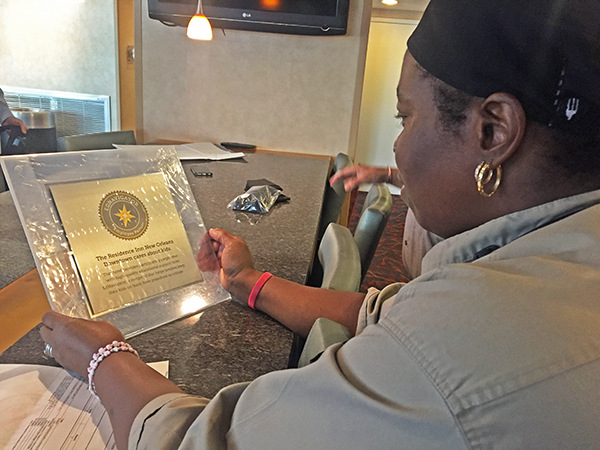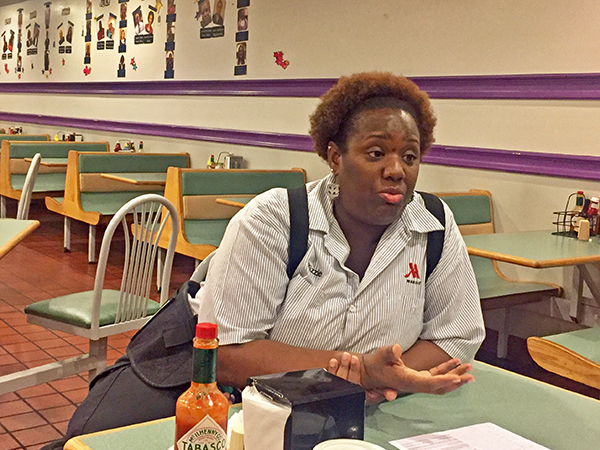New Orleans, La.
Jovon Melrose sent the text message on a recent Friday: “Milton out for three days again. I’ll call you when I get off.”
Melrose, a housekeeper at the New Orleans Marriott, was sharing the bad news that her 14-year-old son had been suspended, once more, for cutting class.
Milton was diagnosed with bipolar disorder and schizophrenia and struggled to adjust to high school. For most of the fall, he worked with other children with disabilities in a self-contained classroom, but it embarrassed him to be separated from the other students, so he stopped showing up — and the suspensions began.
Melrose was worried, and not just about her son’s academic status. She has no car, and, as a single parent, she can’t afford to take more time off work to pick him up if he’s suspended again. Which means the young man would be forced to walk home alone through the Lower Ninth Ward, one of the most crime-ridden neighborhoods in
one of the most dangerous cities in the country.
Melrose needed help with her son; she needed help keeping him safe. She needed help handling the school.
That’s why she texted Rameisha Johnson, her adviser for all things involving Milton and his education.
During the past seven months, the women have texted or emailed daily and met every couple of weeks to catch up on Milton’s academics and emotional well-being and to set his near- and long-term school goals.
Johnson is an employee benefit, a human one. The New Orleans Marriott is one of 11 hotels in the city (eight of them Marriotts) that recently began offering one-on-one school guidance and mentoring to employees as an option, like dental care or an IRA, in their job benefits package. Employees who sign up are matched with EdNavigator, a new nonprofit that aims to provide lower-income parents with the extensive school engagement that is usually a perquisite of the affluent.
Irion Cloud, a housekeeper at International House Hotel in New Orleans, is working with EdNavigator to get help for her school-age daughters.
Photo: Mareesa Nicosia
Working with employers, the group is able to provide advisers for school-related problems and decisions at parents’ jobs and homes. In this way, they are flipping traditional models of family involvement, which, by requiring them to come to school, often disadvantage the parents who may need help most: single parents who can’t miss work and others who don’t know where they should go or whom to talk to or how to advocate effectively.
More specifically, the 50 workers who have already been using the new benefit for months — mostly black and Hispanic, often single parents and most without a college degree — typically seek help decoding jargon-filled instruction forms and mailings, selecting schools and traversing the bog of special education. The advisers — called Navigators — are former educators and administrators with years of experience negotiating dysfunctional school bureaucracies that feel impenetrable to many parents. (EdNavigator recently signed several new partners, including Tulane University, which expands its offerings to an additional 620 workers.)
In Melrose’s case, Johnson, a past school counselor and supervisor, is used for many functions: She “translates” the edspeak in school communiqués, helps deal with a recalcitrant teacher, chased down Milton’s missing suspension records, arranged a re-evaluation after school officials suggested he was illiterate, and dashed to the school in the middle of the day when he had an emotional meltdown.
Perhaps most important to Melrose, Johnson provides a clear accounting of the services Milton is entitled to as part of his Individualized Education Program.
Johnson’s immersive relationship with the family has helped the boy progress, Melrose believes, albeit slowly and despite difficulties. “My child came from zero to something,” she said in an interview.
She also suggested that without Johnson she may not have been able to hang on to her job at the Marriott, where she’s worked for four years cleaning rooms and training other housekeepers.
“When I say it’s a blessing, it’s a blessing,” Melrose said. “And it helps me too, to be a better parent.”
The sell
When EdNavigator first approached New Orleans hotels with its unusual proposal for melding commerce with education activism, many were initially skeptical. Eventually, they came around to the idea that helping to facilitate employees’ involvement in their children’s schools could add up to big savings in the high-turnover hospitality industry — nationally, 72 percent of hospitality industry and restaurant employees did not stay in their jobs in 2015,
up five percentage points from 2014.
The value of advisers like Johnson, the hotel executives wagered, would keep employees from moving on to other jobs as quickly and reduce missed shifts.
“Turnover happens to be a big issue in our industry, and if we can concentrate on fixing some of the things outside of work that might be nuisances to folks, it’ll allow them to be at work, be more productive and [have] less time lost,” said Keith Schmitt, the director of human resources at the New Orleans Marriott.
“The investments that we make in systemic change need to be balanced with investments in supports for families … there has been way too much imbalance.” —Tim Daly, EdNavigator co-founder
Schmitt acknowledged that his hotel, along with four other Marriott properties in New Orleans, was wary even as it signed up 20 employees for the program last spring for a beta test of sorts. Buoyed by the early positive results reported by managers — employees are said to be more focused, and there are fewer late arrivals — Marriott executives plan to expand the number of families in 2017.
“I don’t think it’s naive to believe that we can hopefully have a small impact on the overall educational process here,” Schmitt said. “I think what we’re doing here, I see [its impact]. If EdNavigator can then expand and all of a sudden you’ve got 1,500, 2,000, 5,000 families being serviced in this community … I think certainly that will have a total impact on the whole educational environment in the city of New Orleans.”
Greta Harrell, a cook at the Residence Inn in New Orleans, admires a participation plaque from EdNavigator. The organization works with businesses to provide school-related mentoring and support for employees and their children.
Photo: Mareesa Nicosia
Setting sail
EdNavigator was launched in the summer of 2015 by three former top executives of
The New Teacher Project (known today as TNTP), a teacher-training and advocacy organization that became one of the important outposts of education reform.
Over time, Tim Daly, TNTP’s former president; Ariela Rozman, its CEO; and communications chief David Keeling came to believe that large-scale educational change needed to include making schools easier for parents to use.
That perspective was almost entirely absent from reform efforts, said Daly.
“The investments that we make in systemic change need to be balanced with investments in supports for families, and I think there has been way too much imbalance,” he said.
Daly argues that policy has been overly focused on accountability, teacher evaluation and testing, displacing the more immediate needs of parents. New resources, like more granular educational data, are often inaccessible to parents, he said.
“I think that we would like the idea that ‘You get help with education’ to be a universal. That anyone who wants it can get it,” he said, likening it to the expectation that if you show up injured at an emergency room, you’ll receive medical care. “The question is how to deliver that.”
He and his colleagues believed that school needed to be brought to parents, rather than the reverse, and they began working on a plan that would enable businesses to incentivize high-quality parent engagement in ways schools and advocacy groups weren’t able to.
Advisers and stakeholders in both education and business resisted the concept, Daly said.
“We had lots of people just kind of straight up tell us, like, [employers are] never gonna pay for this,” he said.
As it turned out, though, employers in New Orleans’s hospitality sector — a major driver of the city’s
$7 billion tourism industry — needed ideas for slowing the churn created by a 60 percent (and trending upward) turnover rate.
Kizzie Youngblood, a hotel employee in New Orleans, is working with EdNavigator to learn how to help her son get better grades.
Photo: Mareesa Nicosia
New Orleans had other advantages for the fledging group. TNTP had started
training teachers in the city after Hurricane Katrina, so Daly and the others knew the schools well and had expertise with the new
OneApp enrollment system, which consolidated school options on a single admissions form for families to choose among — creating a market for advising parents about selections.
To raise seed money, EdNavigator successfully made the case that it could convince businesses that investing in the educational outcomes of workers’ families was a money saver. To date it has raised more than $3.6 million.
Through their contacts, the co-founders arranged to self-fund a pilot in August 2015 at International House, a high-ceilinged boutique hotel in a Beaux Arts building near the French Quarter. The hotel subsequently re-signed for a full year beginning in January 2016, General Manager Amy Reimer said, and re-upped in 2017. To date, 13 of the hotel’s 60 employees are paired with a Navigator.
Reimer, an industry veteran, turned out to be an ideal ambassador for the program; she had worked at International House since it opened 18 years before and was a past president of the
Greater New Orleans Hotel & Lodging Association. She gladly pitched EdNavigator to colleagues around the city with the observation that by helping workers with their kids in school, the hoteliers would have happier employees who were more likely to stay longer, potentially saving thousands of dollars in hiring and training costs over time.
As with EdNavigator’s early presentations, Reimer said she received a lot of blank stares and head-scratching.
But the potential savings were hard to dismiss outright. Reimer estimated that International House pays $3,800 in hiring, training and other costs each time someone leaves.
“When you start talking bottom line and what it costs for turnover per person, and if that can be reduced, then selfishly, a few more eyes opened in the room,” she said in an interview, perched on antiquey red velvet cushions scattered through the bar at International House. “I think the reduction in turnover is really what caught everybody’s ear.”
The hotels pay EdNavigator a $250 sign-up fee for each employee, then $37.50 monthly per employee. International House budgeted about $6,700 for the year, according to Reimer; Marriott spent about $15,000 in 2016, said Schmitt, the human resources director.
‘A load lifted off the parent’
Five full-time Navigators work with the clients. They describe their task at the outset to be gaining trust — which is made easier by the fact that most were born and raised in New Orleans and share that frame of reference with the hotel workers.
“You can’t always speak in academic terms; you have to create an informal relationship so parents know that you speak the language,” said Gary Briggs, a former charter school teacher. “We share the same culture, the same background to a certain extent — I use that as leverage to get things done for the kid.”
In practice, the Navigators act as teachers, principals, consultants, therapists and personal assistants, depending on what the situation calls for. They monitor special education to ensure that students are classified properly and receive their services — a recurrent issue among clients. They decipher progress reports, help with school selection and ensure that basic functions — schools posting calendars, homework assignments being retrieved from backpacks — get done.
They need soft skills as well: the ability to cajole, petition or demand action from a school official or give a family tough love or an outpouring of affirmation, whichever helps more.
In one instance, Navigators helped a parent who was waking before dawn each day to drop off her six school-aged children at their five different schools before rushing to her job as a housekeeper; the group “consolidated” three siblings into one school and positioned the younger two, who were in Head Start, to join their siblings later.
“It’s just a load lifted off the parent,” said Navigator Karen Johnston, a former teacher who works with employees at the Hyatt Regency.
Their presence alone can create more responsiveness from schools. Daly’s presence at a special-education meeting, for instance, seemed to trigger an about-face from school officials who had been dragging their feet on providing services for a transfer student with attention deficit hyperactivity disorder.
The student’s parents, Kenny and Greta Harrell, the chief engineer and a cook at the Residence Inn Marriott, at first worried that school officials would retaliate if they brought an advocate to the meeting. They were happily surprised. “I’m telling you, the change in all the teachers — they like, pay attention to us. They listen to us,” Kenny Harrell said.
To meet demand, the organization plans to add staff specializing in special education and English-language-learner issues.
“Special education is something that the ball is being dropped over and over and over again,” said Johnson, the Navigator working with Melrose and her son. “And then parents, not being the experts in what they’re supposed to be getting, are really clueless sometimes in how they are supposed to be treated, how their students are supposed to be treated. So my primary work with my special-needs students is to make sure that parent and student rights are being met.”
The organization has also provided lighter support, mostly for free, to about 200 parents, including one-time consultations for families at a local day care center who wanted help with kindergarten enrollment using OneApp.
Vito Borrello, executive director of the National Association for Family, School and Community Engagement, said dealing with schools can be especially challenging for parents with lower levels of education and low incomes.
“So much of what EdNavigator is doing is what you’d expect public schools to do. But we’re just not there,” Borrello said. “Generally speaking, the public school system hasn’t done a good enough job creating a culture of welcome for families. So I think the idea of this [exercising parental choice] is excellent.”
The Big Easy and beyond
Daly and his colleagues hope to reach thousands of families in the New Orleans metro area by persuading other large local employers to offer their service. While it still relies on grant funding, EdNavigator estimates that contracts with businesses will cover an increasingly bigger percentage of its operating costs.
To that end, it recently finalized an agreement to work with 345 employees at Tulane University and is negotiating a deal with Ochsner Medical Center, one of New Orleans’s largest employers. In addition, the group is exploring opportunities with construction businesses and hospitality outfitting and supply companies. Smaller partnerships are also possible with the city’s cultural institutions, such as Preservation Hall.
In the future, EdNavigator may consider expanding into Boston, Washington, D.C., Las Vegas, Atlanta or Nashville — all cities with large charter school sectors as well as magnet and specialty school options within the traditional public school system.
Disclosure: The 74 and EdNavigator both receive funding from the Bill & Melinda Gates Foundation, Bloomberg Philanthropies, the Carnegie Corporation of New York and the Walton Family Foundation.





;)
